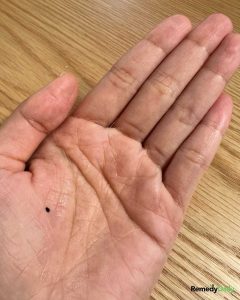In recent years, a simple yet powerful symbol has emerged as a silent cry for help among victims of domestic violence: the black dot on the palm. This small, inconspicuous mark has become a beacon of hope and solidarity for those who suffer in silence, offering a lifeline to escape from abusive situations.
In this article, we will delve into the origins of the Black Dot Campaign, how it started, and what someone should do if they see this cryptic symbol on another person’s hand.
The Origins of the Black Dot Campaign
The Black Dot Campaign began as a grassroots movement in the United Kingdom, and it quickly spread worldwide. It is believed to have started in 2015 as a way to help victims of domestic abuse discreetly signal their need for assistance without alerting their abusers. The original post was by a domestic victim abuse survivor. It quickly took off, even supported by TV personalities like Dr. Drew Pinsky.
The core idea behind the campaign is that survivors can draw a black dot on the palm of their hand. This unobtrusive mark serves as a subtle message to healthcare professionals, law enforcement officers, or anyone who may come into contact with the survivor that they are in danger or need help.
Why the Black Dot?
The choice of a black dot as the symbol for this campaign is significant. It’s a minimalistic, easily recognizable mark that can be drawn with a pen or marker and is unlikely to draw attention. At first glance, it may appear as a mere blemish or accidental ink smudge, which is precisely the point. The goal is to provide a covert means for survivors to communicate their distress to others.
What to Do If You See a Black Dot
If you notice a black dot on someone’s palm and suspect that it may be related to the Black Dot Campaign, it’s crucial to handle the situation with sensitivity and caution. Here’s what you should do:
Do Not Confront the Person Directly:
Avoid directly asking the person about the black dot. Remember that they may be in immediate danger, and any confrontation could escalate their situation.
Seek Privacy:
If possible, find a way to talk to the person in private, away from their potential abuser.
Use Discreet Communication:
When speaking to the person, use discreet and non-confrontational language. Express your concern for their well-being and let them know you are there to help.
Offer Support:
Let the person know that there are resources available to assist them. You can provide them with the contact information of local domestic violence organizations, shelters, or hotlines where they can seek help and guidance.
Report to Authorities:
If you believe the person is in immediate danger, contact the appropriate authorities, such as the police or social services, to ensure their safety.
Respect Their Choices:
Understand that the person may not be ready to leave their abusive situation immediately. Respect their choices and provide support without judgment.
Conclusion
The Black Dot Campaign is a powerful example of how a simple symbol can be used to silently communicate distress and the need for help among victims of domestic violence. By understanding the origins and significance of the black dot, as well as how to respond when you encounter it, you can play a vital role in supporting those who are suffering in silence. Domestic violence is a pervasive issue, and the Black Dot Campaign offers a lifeline to those who desperately need it, allowing them to take the first step toward safety and healing.










